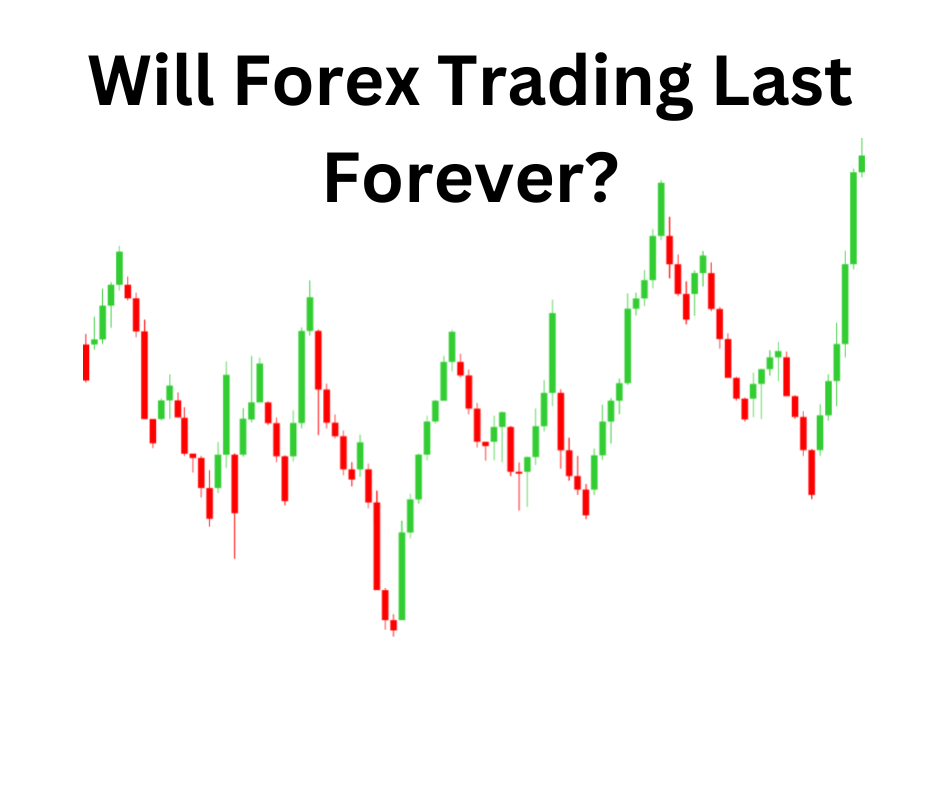Forex trading has been around for many years, but with the rapid evolution of technology and the global economy, it’s natural to wonder if it will last forever.
While the forex market has shown resilience and adaptability in the face of change, it’s impossible to predict exactly how it will fare in the future.
In this blog post, we’ll explore the longevity of forex trading and consider whether it will stand the test of time or fade away.
Will forex trading last forever?
It’s difficult to predict exactly how long any particular activity or market will last, and forex trading is no exception. While the forex market has demonstrated resilience and adaptability in the face of change, it’s impossible to say whether it will last forever.
Factors such as emerging technologies, economic and political events, and changes in consumer behavior could potentially impact the market and influence its future growth or decline.
Here, decline could also simply mean its accessibility to retail traders!
It’s important to keep an eye on these developments and understand the risks and opportunities involved in forex trading in order to make informed decisions.

The Current State Of the Foreign exchange market
The forex market is currently the most liquid financial market in the world, with a daily trading volume of over $5 trillion.
It operates 24 hours a day, 5 days a week, and is highly decentralized, meaning that retail traders, or individual investors, can easily buy and sell foreign currency at any time.
In modern forex trading, traders have access to a wide range of tools and technologies to help them analyze and execute trades, including trading platforms and market analysis software.
Many traders also use technical analysis techniques, such as chart patterns and indicators, to help them identify trends and make trading decisions.
In order to trade forex, traders must typically open a forex trading account with a broker and follow the rules and guidelines set by the relevant regulatory body.
While the stock market is also a popular destination for investors, the forex market allows traders to trade currency pairs, rather than individual stocks, and offers more flexibility and opportunities for profit because this market is much more liquid.
Regulations in the Forex Market
Regulatory bodies, such as the Financial Conduct Authority (FCA) in the UK and the Commodity Futures Trading Commission (CFTC) in the US, play a crucial role in ensuring the integrity and fairness of the forex market.
These bodies set rules and regulations for brokers and traders to follow, and they also work to protect investors from fraud and other forms of misconduct.
To trade forex, traders must typically register with a regulated broker and follow the rules and guidelines set by the relevant regulatory body.
One of the main functions of regulatory bodies in the forex market is to ensure that brokers are operating in a transparent and fair manner. This includes requiring brokers to disclose important information, such as their fees and trading conditions, to traders.
Regulatory bodies also set minimum capital requirements for brokers to ensure they have the financial resources to cover their traders’ positions. In addition, regulatory bodies may conduct audits and investigations to ensure that brokers comply with their regulations.
Overall, regulatory bodies play a vital role in maintaining the integrity of the forex market and protecting investors from fraud and misconduct.
By following the rules and guidelines set by these bodies, traders can have confidence in the fairness and transparency of the market and focus on making informed trading decisions.
Countries that currently restrict Forex trading activities
Several countries currently restrict forex trading activities in one way or another. Some of these countries include:
- Bangladesh: Forex trading is illegal in Bangladesh, and the Bangladesh Bank has issued a circular warning against it.
- Bhutan: Forex trading is not allowed in Bhutan, and the Royal Monetary Authority of Bhutan has warned against it.
- China: While forex trading is not illegal in China, the Chinese government has strict controls on the foreign exchange market and has placed limits on the amount of money individuals can invest in foreign currency.
- India: Forex trading is legal in India, but the Reserve Bank of India has placed certain restrictions on it, including limits on the amount of money individuals can invest in foreign currency.
- Iran: Forex trading is illegal in Iran, and the Central Bank of Iran has warned against it.
- Nepal: Forex trading is illegal in Nepal, and the Nepal Rastra Bank has warned against it.
It’s worth noting that these restrictions are subject to change and may vary depending on each country’s specific circumstances and policies.
It’s always a good idea to check the local laws and regulations before engaging in any financial activities, including forex trading.
The Future of the Forex Market
The future of forex trading is somewhat uncertain, and there are a number of factors that could potentially impact the market.
One of these is the emergence of new technologies, such as artificial intelligence and machine learning. These technologies could potentially change the way trades are executed and analyzed and could also disrupt the traditional role of forex brokers.
For example, micro trading accounts, which allow traders to trade with very small amounts of capital, could become more popular as a result of these technologies.
Another factor that could impact the future of forex trading is economic and political events. Changes in government policies, such as interest rate decisions or trade agreements, can affect the value of one currency relative to another and influence the demand for different currencies – this may eliminate some trading pairs in the future!
Economic indicators, such as gross domestic product (GDP) and employment rates, can also impact the forex market. For example, a strong economy may lead to an increase in international trade and a corresponding increase in the demand for a particular currency.
While the market has historically shown resilience and adaptability, it’s possible that emerging technologies or economic events could disrupt the market, leading to a decline in retail forex trading.
On the other hand, the market could continue to grow as more traders become interested in the opportunity to trade currencies.
The futures market, which allows traders to speculate on the future direction of currency prices, could also potentially contribute to the growth of forex trading. Ultimately, the future of the forex market will depend on various factors and is something that only time will tell.
A short history lesson on the Foreign exchange market
In the 1970s, the Bretton Woods Agreement collapsed, leading to floating exchange rates and creating the modern forex market as we know it. Prior to this, exchange rates were fixed, and international trade was conducted using gold as the primary medium of exchange.
The floating of exchange rates allowed for more currency value flexibility and opened the market to a wider range of participants, including individual traders.
Today, the forex market is a global market that operates 24 hours a day, 5 days a week. It is the largest financial market in the world, with a daily trading volume of over $5 trillion.
Trading forex involves the buying and selling of currencies, and the market is highly diverse, with a wide range of participants, including banks, corporations, and individual traders.
The market is also highly liquid, with a large volume of daily forex transactions, and it is influenced by a variety of factors, including currency fluctuations, economic indicators, and global events. The market is primarily made up of fiat currencies, which are currencies that are not backed by physical commodities, such as gold.
More:
Is it possible to make a living trading Forex?
Frequently asked questions
Will forex trading last forever?
It’s difficult to predict exactly how long any particular activity or market will last, and forex trading is no exception. While the forex market has a long history dating back to ancient civilizations and has demonstrated resilience and adaptability in the face of change, it’s impossible to say for certain whether it will last forever.
Factors such as emerging technologies, economic and political events, and changes in consumer behavior could potentially impact the market and influence its future growth or decline. It’s important to keep an eye on these developments and understand the risks and opportunities involved in forex trading in order to make informed decisions.
What could potentially impact the future of forex trading?
There are a number of factors that could potentially impact the future of forex trading, including emerging technologies, economic and political events, and changes in consumer behavior.
For example, adopting artificial intelligence and machine learning in trading algorithms could potentially change how trades are executed and analyzed. Economic indicators, such as gross domestic product (GDP) and employment rates, can also impact the forex market.
Additionally, shifts in consumer behavior, such as a change in the demand for certain currencies, could potentially impact the market.
Is forex trading a safe investment?
As with any investment, forex trading carries certain risks and it’s important to understand these risks before getting started.
The forex market is highly volatile and can be affected by a variety of factors, including currency fluctuations, economic indicators, and global events. It’s important to do your research and understand the market before trading forex, and it’s also a good idea to diversify your portfolio to minimize risk.
Additionally, it’s important to choose a reputable and regulated broker to ensure that your investments are protected. While there are risks involved in forex trading, it can also be a lucrative investment opportunity for those who are well-informed and disciplined in their approach.
